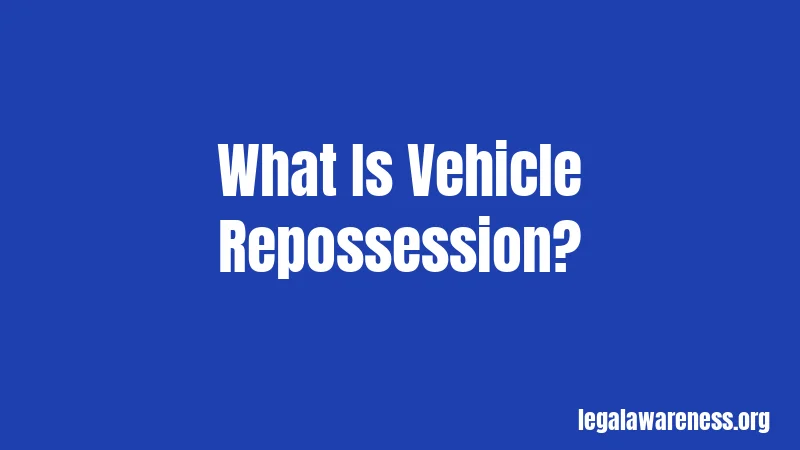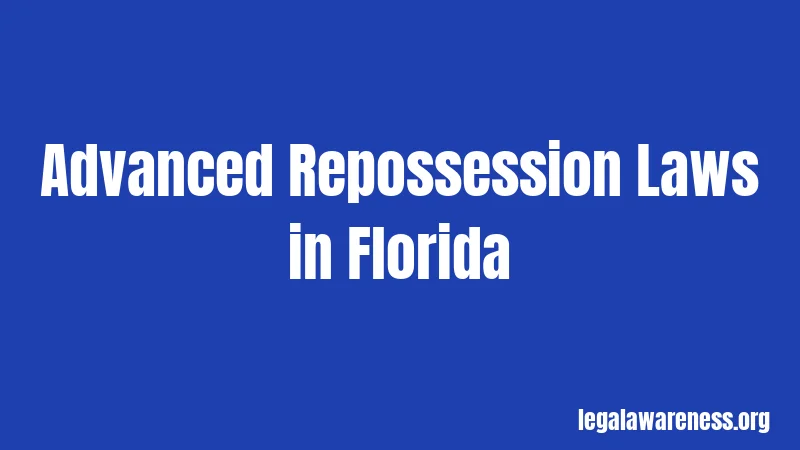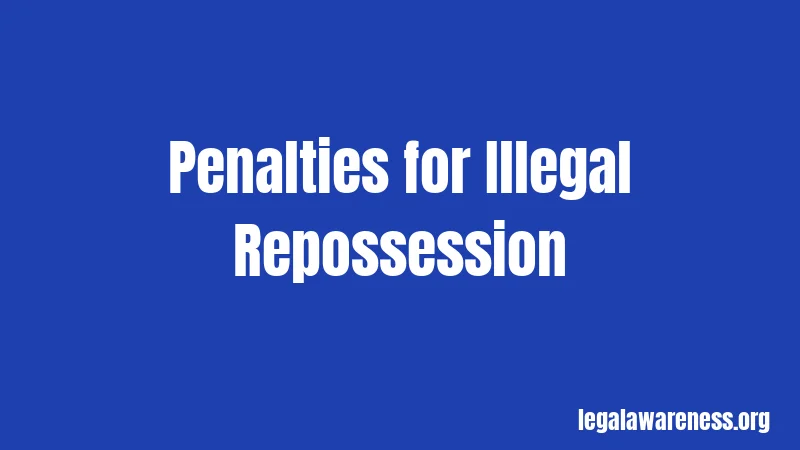Florida Repossession Laws in 2026: Your Rights and Protections
Your car gets repossessed. It happens faster than you’d think. One day you’re behind on payments. The next day, your vehicle is gone. But here’s what most people don’t realize: Florida has strict rules about how, when, and where repossession can happen. Understanding these laws could literally save you thousands of dollars and serious headaches.
In Florida, lenders can’t just take your car whenever they want. There are rules they must follow. There are also ways you can protect yourself. Let’s break down exactly what you need to know about Florida repossession laws so you’re not caught off guard.
What Is Vehicle Repossession?

Repossession is when a lender takes back a vehicle because you haven’t made your payments. Think of it like this: the lender owns the car until you pay it off completely. If you stop paying, they can legally come get it back. Simple enough, right?
But here’s the important part: just because they can repossess doesn’t mean they can do it however they want. Florida law puts limits on what lenders can and cannot do. Those limits exist to protect you from harassment, trespassing, and dangerous situations.
Florida’s Basic Repossession Rules
When Can a Lender Repossess Your Car?
In Florida, a lender can typically repossess your vehicle after you’ve missed just one payment. Yep, that’s all it takes legally. However, most lenders wait for multiple missed payments before taking action. It’s not profitable for them to repossess over one payment.
Most lenders will contact you first. They’ll call, send letters, or text you about missed payments. They might offer you a chance to catch up. But legally? They don’t have to wait long. Stay with me here because this next part matters.
How Must They Repossess?
This is where Florida protects you. The repossession has to be done without “breach of peace.” That’s legal language, but it basically means they can’t be violent, threatening, or disruptive. They can’t break into your garage. They can’t damage your property. They can’t threaten you or your family.
Think of it like a traffic ticket, but with specific rules about HOW they grab your car. The repossession agent can’t trespass on someone else’s property without permission. They can’t force open locked gates. They can’t physically fight with you or damage your belongings during the process.
Where Can They Repossess?
Your vehicle can be repossessed from your driveway, a parking lot, or a street. The repossession agent can follow you to get your car. What they can’t do is go into your garage, into your home, or onto someone else’s private property without permission.
Here’s where people get confused: if your car is parked in a public area, it’s fair game. If it’s visible from public property, it’s fair game. But if it’s locked in a garage on your property? That’s different. They’d need permission or a court order.
Advanced Repossession Laws in Florida

The Right to Cure Your Debt
Okay, pause. Read this carefully. Florida gives you something called “the right to cure.” This is huge. If you’re behind on payments, you might have the chance to catch up and stop the repossession. But there’s a timing issue here.
You have the right to cure your debt BEFORE the repossession happens. Once they’ve actually taken your car, it’s basically too late. This is why timing matters so much. If you get a notice of repossession coming, act immediately. Contact your lender right away.
Not all lenders have to offer a cure period, but many do. Check your loan contract. Call your lender and ask about payment plans or catch-up options. Some will work with you if you reach out proactively. Honestly, this is the part most people miss. They get scared and do nothing, which is the worst choice.
Notice Requirements
Florida requires lenders to provide certain notices before repossession. They must tell you what’s happening and give you a chance to resolve the situation. The specific notice requirements are in your loan contract and in Florida’s consumer protection laws.
Generally, you’ll get notice that you’re in default. You’ll get information about what you owe and what you need to do to prevent repossession. Read these carefully. Don’t ignore letters from your lender. They’re your warning system.
Deficiency Balances: The Hidden Problem
Here’s where it gets serious. After your car is repossessed, the lender will sell it. They’ll probably get less money than you still owe. That difference is called a “deficiency balance,” and you might have to pay it.
Let’s say you owe $12,000 on your car. They repossess it and sell it for $8,000 at auction. That $4,000 difference? You could owe that. In Florida, lenders can pursue you for deficiency balances through the court system. They can try to garnish your wages or put a judgment against you.
This is probably the most important reason to address missed payments early. The longer you wait, the worse this gets. Catching up on payments or working out a deal early stops this whole nightmare from happening.
Can They Sue You for Deficiency?
Yes, and this is critical. After repossessing your vehicle, a Florida lender can file a lawsuit against you for the deficiency balance. They can win that lawsuit. Once they win, they can garnish your wages, freeze your bank accounts, or put a lien on your property.
The process works like this: they repossess, they sell the car, they calculate what you still owe, they sue you, they win, they collect. It’s a real chain of events. The good news? You can defend yourself in court. You can dispute how they sold the car, dispute the amounts, or work out a settlement before it gets that far.
Penalties for Illegal Repossession

Now let’s talk about what happens when lenders break the rules. Florida doesn’t tolerate illegal repossession. If a lender violates your rights, you can sue them.
If they breach the peace during repossession, you can sue for damages. If they trespass on your property, you can sue. If they damage your belongings or threaten you, you can absolutely sue. You might recover money for actual damages. You might also recover for emotional distress or other harms.
Courts take these violations seriously. You can potentially recover several thousand dollars if a repossession company breaks the law. This is why having legal representation can pay off. A lawyer can review what happened and determine if you have a case.
Your Defenses and Protections
The Breach of Peace Standard
Wondering if what happened to you was illegal? Look at whether the repossession involved a breach of peace. Did they threaten you? Did they trespass? Did they damage property? Did they act aggressively? These are all possible breaches of peace.
Florida courts are pretty clear about this. Repossession companies must conduct themselves calmly and professionally. They can’t create a scene or put you in danger. If things got physical or aggressive, you likely have a legal claim.
Your Right to Recover the Vehicle
If your car was repossessed illegally, you might be able to get it back. You can file a lawsuit asking the court to return your vehicle. This has to happen fairly quickly. You’ll need to prove the repossession violated Florida law.
The court will look at what happened. If they find an illegal repossession, they can order the car returned to you. You’d typically have to post a bond or prove you can care for the vehicle while the case proceeds.
What Happens After Repossession
The Sale of Your Vehicle
After repossession, your lender will prepare your car for sale. They might hold it in a storage lot for a bit. They’ll eventually sell it, probably at an auction. Florida law requires lenders to sell the vehicle in a “commercially reasonable” manner.
That means they can’t just give it away or sell it to a buddy for next to nothing. They have to make a genuine effort to get fair market value. If they don’t, that actually helps you in a deficiency lawsuit. You can argue they didn’t sell it correctly and shouldn’t be able to come after you for the full deficiency.
Redemption Rights
Here’s something really important: in some cases, you can buy your car back after repossession. This is called redemption. You might be able to pay off the entire debt, plus the repossession and storage costs, and get your car back. The timeframe for this varies, so check your contract and Florida law.
Not all situations allow redemption, but some do. If your car was just repossessed, contact your lender immediately about whether redemption is an option. It’s usually way cheaper than dealing with a deficiency lawsuit later.
How to Protect Yourself From Repossession
Stay Ahead of Payments
This is the obvious one, but it’s the most important. Make your payments on time. If money’s tight, contact your lender before you miss a payment. Many will work with you on payment arrangements.
Lenders want money, not cars. They’d rather get paid than repossess. Talk to them if you’re struggling. They might offer a forbearance agreement, loan modification, or payment plan. These options exist. You just have to ask.
Understand Your Loan Contract
Read your loan agreement carefully. Know the terms. Know what triggers repossession. Know if there’s a right to cure period. Know what notice they have to give you. This contract is your roadmap for understanding what can and can’t happen.
If you don’t understand something, ask your lender or a lawyer. Don’t just sign and ignore it. The more you understand your contract, the better you can protect yourself.
Document Everything
If you’re having payment issues or problems with your lender, keep records. Save emails, text messages, and letters. Keep payment stubs. Write down dates and times of phone calls. If something goes wrong, this documentation will be invaluable.
If a repossession happens, take photos and videos. Document the condition of your car and the surroundings. Write down the names of anyone involved. Get witness information if possible. All of this could matter for a lawsuit.
Consider Legal Help Early
Honestly, if you’re about to lose your car or it’s already been repossessed, talk to a lawyer. Many lawyers offer free consultations. A lawyer can review your situation, explain your rights, and help you figure out your best options.
You might have a claim against the repossession company. You might have defenses in a deficiency lawsuit. You might be able to negotiate with your lender. An attorney can guide you through these options.
Special Situations in Florida
Repossession of Leased Vehicles
Leased cars have slightly different rules than financed cars. The leasing company owns the vehicle throughout the lease. If you don’t make payments, they can repossess it. The same breach of peace rules still apply, though.
If a leased vehicle is repossessed, you won’t owe a deficiency balance like you would with a financed car. The leasing company owns the vehicle, so they take the loss. This is actually one advantage of leasing over financing.
Repossession for Non-Payment of Insurance
Here’s a tricky one. If your auto insurance lapses and the lender’s insurance requirement isn’t met, they might repossess your car. This isn’t as common, but it can happen. Your loan likely requires you to maintain full insurance coverage.
If your insurance lapses, contact your lender immediately. Tell them you’re getting new coverage. They might not repossess if you fix the insurance issue quickly. But if you ignore it, they could take action.
Frequently Asked Questions
How long after missing a payment can they repossess my car?
Legally, they can repossess after just one missed payment, but most wait for several. Check your loan contract for specific details. Most lenders wait 60 to 90 days before actually repossessing, though they’ll contact you way before that.
Can repossession agents come onto my property?
They can’t enter your home, garage, or break through locked gates without permission. Your driveway or a public street is fair game. If they trespass, that’s an illegal breach of peace, and you might have a lawsuit.
What should I do if I see a repossession happening?
Stay calm and don’t physically interfere. Get the names, company name, and badge numbers of anyone involved. Take photos or videos. Don’t sign anything. Contact a lawyer immediately after. Get witness information from anyone who saw it.
Can I get my car back after repossession?
Sometimes, through redemption. You might be able to pay off the full debt plus repossession and storage costs to get your car back. The timeframe is limited, so act fast. Call your lender immediately to ask about redemption options.
What is a deficiency balance, and do I have to pay it?
It’s the amount you still owe after the lender sells your repossessed car. If the sale price is less than your remaining loan balance, you might owe the difference. The lender can sue you to collect it. You can defend yourself in court.
Can I sue if my car was repossessed illegally?
Yes, absolutely. If the repossession involved a breach of peace, trespassing, threats, or property damage, you have a legal claim. You might recover money for damages. Contact a lawyer to discuss your specific situation.
Do I have to be notified before repossession?
Florida requires lenders to provide notice according to your loan contract and consumer protection laws. You should receive notice of default and a chance to cure. Read all notices carefully. Don’t ignore them.
What happens to my belongings in the car?
Your personal belongings left in the car should be returned to you. If they’re lost or damaged, you might have a claim. Document what was in your vehicle. Contact the lender or repossession company about recovering your items.
Final Thoughts
Repossession is stressful, but you’re not helpless. Florida law gives you real protections. You have the right to cure your debt before repossession happens. You have the right to challenge illegal repossession. You have the right to defend yourself against deficiency lawsuits.
The key is acting fast. If you’re behind on payments, contact your lender immediately. Don’t wait. If your car gets repossessed, document everything and call a lawyer. If you’re dealing with a deficiency lawsuit, don’t ignore the court papers.
Know your rights. Protect yourself. When in doubt, ask a lawyer. Now you’ve got the information you need to handle this situation smartly.
References
Florida Statute Chapter 537: Secured Transactions
Florida Consumer Protection Laws
Federal Fair Debt Collection Practices Act
Florida Attorney General Consumer Protection Information
